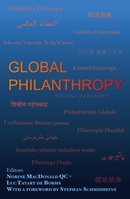 At almost 400 pages and with 27 chapters, each by a different author, Global Philanthropy is a remarkable editorial achievement – and all the more so considering that the authors are all ‘active philanthropic players’. The contributions are truly global, covering all regions of the world – though Western Europe gets little discussion, presumably because it was covered in the editors’ previous work, European Philanthropy: A rich past, a promising future, to which this is a companion. The theme of the book is described as a ‘first look at the common themes and goals of philanthropy around the world’.
At almost 400 pages and with 27 chapters, each by a different author, Global Philanthropy is a remarkable editorial achievement – and all the more so considering that the authors are all ‘active philanthropic players’. The contributions are truly global, covering all regions of the world – though Western Europe gets little discussion, presumably because it was covered in the editors’ previous work, European Philanthropy: A rich past, a promising future, to which this is a companion. The theme of the book is described as a ‘first look at the common themes and goals of philanthropy around the world’.
It is impossible in a review of this length to do full justice to each of the 27 chapters. Vincent McGee’s wide-ranging chapter, ‘Stories of Giving: “Asking, Saying Yes, Saying No”’, is full of nuggets of wisdom based on a remarkable range of experience. Breakfast in prison with ex-major politicians, mafia bosses, embezzlers, drug dealers, Jehovah’s Witnesses and a two-star general is not a widely available learning environment but it taught McGee to avoid easy labels and preconceived notions and to pay attention to the ‘disconnect between what is presumed about democratic opportunity and the race, class and power component to which most of us do not pay enough attention’ (p329).
One may not agree with all of McGee’s views, but every one is worth thinking about. His remarks about philanthropy changing the conversation about taxes and distribution of wealth may be particularly timely. ‘It’s crazy to think we can pay less and less in taxes and still live in a fully functioning society,’ he says. Philanthropy can play a role in changing perceptions ‘without being inappropriately political’ (p344). Indeed, the chapter as a whole might serve as an admirable introduction to philanthropy for both donors and staff. McGee’s adage ‘Don’t allow yourself to believe you are the only one who can change the world, but work at change as if you are’ might be adopted as one of the key commandments of philanthropy.
Olga Alexeeva’s chapter, ‘A History of Trust in Distrustful Times’, provides fascinating observations on Russian philanthropy, trust and distrust, and the effects of foreign donor generosity. Alexeeva highlights the existence of a dramatically growing charitable sector with only a marginal role in society – a sector that ‘does not really know where it is going and what it wants to achieve, or why it exists’ (p197). Is the Russian charitable sector alone in this?
Alexeeva’s chapter on Russia, Peter Cleaves’ chapter on the United Arab Emirates and Ailing Zhuang’s chapter on a ‘transitional China’ all raise issues of relevance beyond any particular geographical location. While Cleaves discusses some of the nuances of zakat and its relationship to ‘modern philanthropic mission’ and the relationship of waqf to modern foundations, Zhuang takes us into an Alice in Wonderland world in which ‘words mean whatever I say they mean’. But with its increasingly complex relationships and fine distinctions between government and non-government, is China really so different from other countries?
Michael Madnick’s chapter is, in many respects, one of the most challenging in the entire book. Madnick encourages us to address fundamental questions about the role and real resources of foundations beyond money. He argues for working together across sectors – an approach that requires leaders with skill sets from outside the philanthropic community. He writes compellingly of the exciting things that can happen when the field changes from ‘those with the ideas pitching at those with the money’ to donors, implementers and influencers being on one side of the table – and the problem to be solved on the other.
This book has two types of content: descriptive (sometimes a little self-promoting) and analytic. Both are fascinating. The descriptive content may date more quickly than the analytic, which varies in quantity and quality between chapters. The book is rich and endlessly thought-provoking. It might have been even more so had there been some overarching themes linking chapters – one wonders whether authors were asked to cover certain common themes such as relationship to government, role in society and management styles – and/or a guide to common themes across chapters. Norine MacDonald’s introduction begins to provide a guide, but a book of this scope and scale deserves more.
Finally, a piece of practical advice. Arm yourself with a large, stout elastic band – this book quickly becomes looseleaf!
Diana Leat is a visiting professor at Cass Business School, London, and an independent consultant. Email dianaleat@hotmail.com
Global Philanthropy
Norine MacDonald and Luc Tayart de Borms (eds) MF Publishing £16.99
ISBN 9780956442208
To order
Email kai@alliancemagazine.org



Comments (0)